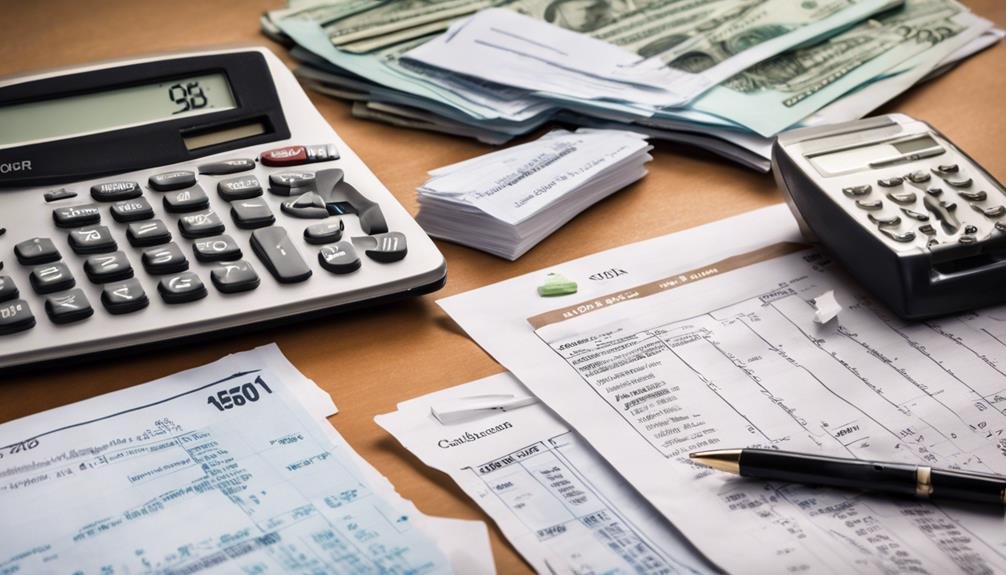When searching for a good tax consultant, it’s important to start with verifying their PTIN and professional credentials, such as being a CPA, tax attorney, or Enrolled Agent. You should also assess their qualifications through trusted sources like IRS directories or state bar associations. However, that’s just the beginning. You must also compare their preparation fees and guarantee transparency to avoid hidden costs. Conducting thorough background checks is essential, but there’s another important aspect you shouldn’t overlook—evaluating their communication style to make sure they can explain complex tax matters clearly. So, how do you make sure you’re making the right choice?
Key Takeaways
- Verify the consultant’s PTIN and professional credentials, such as CPA, Enrolled Agent, or tax attorney.
- Check for competitive and transparent fee structures, avoiding hidden costs.
- Conduct background checks for complaints, disciplinary actions, and client testimonials.
- Ensure clear, prompt communication and compatibility with your preferred communication style.
- Confirm the consultant’s relevant experience and education for handling your tax needs.
Verify PTIN and Credentials

When searching for a reliable tax advisor, verifying their PTIN and credentials is vital. The IRS requires all paid tax return preparers to have a Preparer Tax Identification Number (PTIN). This PTIN guarantees that the IRS acknowledges the tax preparer providing tax preparation services. Ensure your tax advisor’s PTIN is included on your tax return, as it’s a significant indicator of legitimacy and compliance.
You can easily confirm a tax preparer’s PTIN on the official IRS website. This step is crucial because it validates that the IRS recognizes the preparer and follows its standards. Importantly, volunteer tax preparers are exempt from the PTIN requirement, so consider this if you choose volunteer services.
Besides the PTIN, professional credentials play a substantial role. Qualifications such as CPA (Certified Public Accountant), EA (Enrolled Agent), and tax attorney indicate higher expertise and responsibility.
While the PTIN is a fundamental requirement, these additional qualifications can give you confidence in the preparer’s knowledge and capability to manage your tax returns accurately.
Assess Professional Qualifications
Finding a tax consultant with the right professional qualifications is crucial to guarantee your tax needs are met accurately and efficiently. Start by looking for CPAs, tax attorneys, or Enrolled Agents, as these professionals have the necessary expertise to handle your specified tax return. Verify their credentials through the IRS directory or state bar associations to confirm they’re recognized professionals with a solid reputation.
Consider hiring a professional tax preparer who’s completed the IRS Annual Filing Season program. This additional training assures you that the tax consultant stays updated on the latest tax laws and practices.
When dealing with complex tax situations, seek consultants with higher education and specialized training. These qualifications enable them to navigate intricate tax issues more effectively.
Compare Preparation Fees

After confirming the professional qualifications of potential tax consultants, the next step is to compare their preparation fees to ensure you’re getting the best value. The average cost for tax preparers in the US is $251, which provides a benchmark for comparison. It’s vital to ask about itemized vs. non-itemized fees to comprehend the breakdown of costs. Some tax preparers charge a flat fee, while others might bill you hourly or perform. Understanding their pricing structures will assist you in making an informed decision.
Inquire about any hidden costs or extra fees that may impact the total cost of tax preparation. Transparency in fee agreements is necessary to avoid surprises and misunderstandings. Always make sure you’re aware of what you’re paying for and why.
Here’s a quick comparison table to help you evaluate:
| Tax Preparer | Basic Fee | Additional Fees | Itemized Breakdown |
|---|---|---|---|
| Preparer A | $200 | $50 | Yes |
| Preparer B | $220 | $30 | No |
| Preparer C | $250 | $40 | Yes |
| Preparer D | $260 | None | No |
Conduct Background Checks
Before selecting a tax consultant, it’s important to conduct thorough background checks to ensure you’re in good hands. Start by verifying the consultant’s credentials with professional organizations and state licensing boards. This step guarantees they have the necessary qualifications and are in good standing.
Next, check for any complaints or disciplinary actions against the tax consultant. This information can usually be found on state licensing board websites and helps you gauge their trustworthiness. Don’t overlook the power of reviews and testimonials from past clients. These can provide valuable insights into the consultant’s reliability and effectiveness.
Ensure the tax consultant has relevant experience and expertise handling your tax needs. A consultant with a background in your area of concern will be better equipped to offer tailored advice.
Finally, a thorough background search will confirm the consultant’s qualifications and trustworthiness.
Here’s a quick checklist to guide you:
- Verify credentials with professional organizations and state licensing boards.
- Check for complaints or disciplinary actions.
- Look for reviews and testimonials from past clients.
- Confirm relevant experience and expertise in your specific tax needs.
Evaluate Communication and Fit

When evaluating a tax consultant, assessing their communication style is essential to ensure it aligns with your preferences and needs. A tax consultant’s ability to explain complex tax matters clearly and concisely is vital for building a strong working relationship. It would help if you connected with them professionally, guaranteeing that their communication fosters understanding and effective tax planning.
Communication compatibility can greatly enhance the overall experience and efficiency of collaborating with a tax consultant. Please pay attention to how they address your questions and concerns. Do they respond promptly and provide detailed explanations? This will help you gauge their professional demeanor and whether they can meet your expectations.
Effective communication isn’t just about clarity; it’s also about how well you can connect with your consultant. A good fit means you’ll feel comfortable discussing all aspects of your financial situation without hesitation. This level of openness leads to better tax planning and more successful outcomes.
Conclusion
In your search for a good tax consultant, please verify their PTIN and credentials, check their professional qualifications, compare preparation fees, and conduct thorough background checks. Don’t overlook to evaluate their communication style to confirm they’re a good fit for you. By following these steps, you’ll find a trustworthy consultant who can handle your tax matters effectively and give you peace of mind. So, take action now and secure the right expertise!
FAQs
1. Who Is the Best Person to Do Your Taxes?
You should choose a tax professional like a CPA, tax attorney, or enrolled agent. These tax experts provide excellent tax assistance. Comparing accountants, financial planners, and tax specialists can help you find the best tax advisor for your needs.
2. How Much Do Most CPAS Charge?
Most CPAs charge hourly fees ranging from $150 to $450. Average rates depend on pricing factors like complexity. Some offer flat rates or package deals. Consider negotiation tactics, payment options, refund policies, additional costs, and value for money.
3. Is It Worth Going to a Tax Expert?
Yes, going to a tax expert is worth it. DIY vs. Expertise: Experts offer benefits like accuracy, efficiency, and peace of mind. The cost is often outweighed by the value they provide in minimizing errors, reducing stress, and ensuring compliance.
4. What Is the Difference Between a CPA and Ea?
Understanding CPA vs. EA qualifications is essential. CPAs offer broader accounting and financial services, while EAs specialize in taxes. Both meet strict licensing requirements, undergo continuing education, and adhere to professional standards, ensuring industry knowledge and regulatory oversight.

